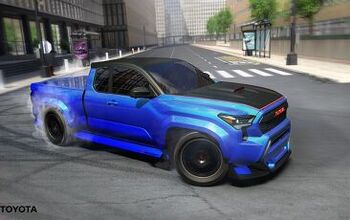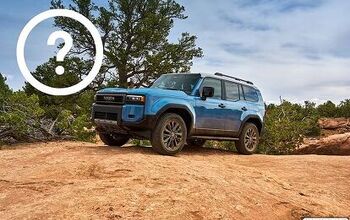Toyota Vows to Stop Being Such a Dinosaur, Muses Partnerships as a Shortcut

Despite being Japan’s biggest automaker, Toyota has lagged behind many of its rivals in terms of cutting-edge technology. Most major car manufacturers have already begun developing self-driving vehicles, with some going so far as to make strategic partnerships with companies specializing in the applicable technologies. By contrast, Toyota has a strong R&D program but never saw fit to pursue autonomous development or battery-electric vehicles quite so aggressively as General Motors or Renault-Nissan, for example.
Toyota President Akio Toyoda has now admitted that may have been a mistake. At the company’s annual shareholders meeting on Wednesday, he promised the automaker would become more committed to achieving technical developments. Toyoda didn’t bring forward a concrete strategy but conceded the spending of additional capital would likely play a role — and an alliance or two isn’t out of the question.
“The auto industry is undergoing big changes, and issues and ideas which we may have thought were far off in the future could affect us tomorrow. That’s why we need to go on the offensive while also preserving our areas of strength,” Toyoda told investors. “We’ve been investing 1 trillion yen each year for R&D, expanding [capital expenditure] and buying back shares, but this may not be enough. We need to consider all our options, including M&A, to survive in the future.”
Toyota has good reason to want to change. While maintaining the status quo has worked well for the brand in the past, its 2016 operating profits slumped 30.1 percent year-over-year, with sales declining 2.8 percent. The automaker predicts more of the same for this year.
“We know that the company won’t be all right if it remains as it is,” Toyota Executive Vice President Osamu Nagata stressed at the meeting. “We will make every effort possible for a recovery.”
The brand as already accelerated some of its efforts to prioritize technological advancement. Last year, Toyota established an official division specifically for electric vehicle development. It has also invested $1 billion into an artificial intelligence research institute and has struck up moderately sized partnerships with Uber Technologies and Microsoft.
There have been other stirrings as of late, including the automaker wanting to form a partnership with Suzuki. While that strategy wouldn’t alleviate Toyota’s tech concerns, it would give it a foothold for selling smaller cars in other parts of Asia. There were also rumors of the company getting into bed with Mazda back in November, although what possible advantage that would give Toyota is unclear.
Either way, Akio Toyoda has previously admitted his company is “not really good” at creating alliances. That might have to change if the company is to adhere to its vow to reshape itself into a more modern manufacturer.
[Source: Reuters] [Image: Toyota]

A staunch consumer advocate tracking industry trends and regulation. Before joining TTAC, Matt spent a decade working for marketing and research firms based in NYC. Clients included several of the world’s largest automakers, global tire brands, and aftermarket part suppliers. Dissatisfied with the corporate world and resentful of having to wear suits everyday, he pivoted to writing about cars. Since then, that man has become an ardent supporter of the right-to-repair movement, been interviewed on the auto industry by national radio broadcasts, driven more rental cars than anyone ever should, participated in amateur rallying events, and received the requisite minimum training as sanctioned by the SCCA. Handy with a wrench, Matt grew up surrounded by Detroit auto workers and managed to get a pizza delivery job before he was legally eligible. He later found himself driving box trucks through Manhattan, guaranteeing future sympathy for actual truckers. He continues to conduct research pertaining to the automotive sector as an independent contractor and has since moved back to his native Michigan, closer to where the cars are born. A contrarian, Matt claims to prefer understeer — stating that front and all-wheel drive vehicles cater best to his driving style.
More by Matt Posky
Latest Car Reviews
Read moreLatest Product Reviews
Read moreRecent Comments
- Dwford I don't think price is the real issue. Plenty of people buy $40-50k gas vehicles every year. It's the functionality. People are worried about range and the ability to easily and quickly recharge. Also, if you want to buy an EV these days, you are mostly limited to midsize 5 passenger crossovers. How about some body style variety??
- SCE to AUX The nose went from terrible to weird.
- Chris P Bacon I'm not a fan of either, but if I had to choose, it would be the RAV. It's built for the long run with a NA engine and an 8 speed transmission. The Honda with a turbo and CVT might still last as long, but maintenance is going to cost more to get to 200000 miles for sure. The Honda is built for the first owner to lease and give back in 36 months. The Toyota is built to own and pass down.
- Dwford Ford's management change their plans like they change their underwear. Where were all the prototypes of the larger EVs that were supposed to come out next year? Or for the next gen EV truck? Nowhere to be seen. Now those vaporware models are on the back burner to pursue cheaper models. Yeah, ok.
- Wjtinfwb My comment about "missing the mark" was directed at, of the mentioned cars, none created huge demand or excitement once they were introduced. All three had some cool aspects; Thunderbird was pretty good exterior, let down by the Lincoln LS dash and the fairly weak 3.9L V8 at launch. The Prowler was super cool and unique, only the little nerf bumpers spoiled the exterior and of course the V6 was a huge letdown. SSR had the beans, but in my opinion was spoiled by the tonneau cover over the bed. Remove the cover, finish the bed with some teak or walnut and I think it could have been more appealing. All three were targeting a very small market (expensive 2-seaters without a prestige badge) which probably contributed. The PT Cruiser succeeded in this space by being both more practical and cheap. Of the three, I'd still like to have a Thunderbird in my garage in a classic color like the silver/green metallic offered in the later years.


































Comments
Join the conversation
Toyota recently sold its TSLA holdings and ended their partnership, which had resulted in the low-volume RAV4 EV. Perhaps they're seeing the light about "fool" cells and are about to embark on their own EV development, after disparaging EVs for so long? Of course, the trick with EVs is how to make money. Only Tesla has a chance at it* in the near term, and they're years ahead of Toyota with the technology, production, supply chain, customer base, and infrastructure that is needed to make headway**. * Before challenging this statement, who else has a chance at actually being profitable with EVs? Tesla *must* become profitable; others don't have to care so much. Tesla's playing every card to do so, especially by operating the Gigafactory to reduce battery costs, which they have repeatedly said is the key for their future viability. ** Even Toyota - as big as they are - can't become an EV powerhouse overnight. Volkswagen is trying, but it's a long road.
Dear Toyota or whoever, I will never set foot in a self-driving vehicle. Ever. Thanks